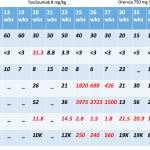Upadacitinib is an investigational, oral, small molecule JAK1-selective inhibitor, which recently completed phase 3 clinical trials for treating patients with moderate to severe rheumatoid arthritis (RA). In late 2018, AbbVie Inc. submitted a New Drug Application to the U.S. Food and Drug Administration, as well as a marketing authorization application to the European Medicines Agency,…








